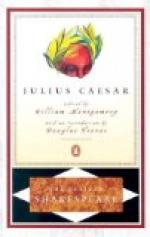|
This section contains 5,750 words (approx. 20 pages at 300 words per page) |

|
SOURCE: Rice, Julian C. “Julius Caesar and the Judgment of the Senses.” Studies in English Literature 1500-1900 13, no. 2 (spring 1973): 238-55.
In the following essay, Rice contends that Julius Caesar promotes a philosophy of character based upon Renaissance Pyrrhonism, a skeptical philosophical position that underscores the antiheroic, fallible, and incongruous attributes of the play's characters.
When Brutus in his oration implores the crowd to awake their senses that they may the better judge (III.ii.17-18), some members of the Globe audience may have been struck by an implicit irony. Given the Pyrrhonic view of the absurd conclusions based on sensory evidence, which man mistakenly calls rational judgment, Brutus's asking men to judge by their senses might have struck an educated Elizabethan as only one more example of the blind folly which pervades Julius Caesar. A case for the centrality of the theme of human irrationality can be supported...
|
This section contains 5,750 words (approx. 20 pages at 300 words per page) |

|


